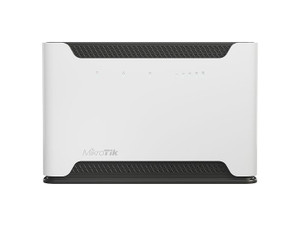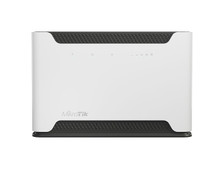Let’s face it – most of the standard issue access points can’t really satisfy the extremely diverse client base – they either lack features, users want more speed and higher gain, the price is too high or they look weird. We decided to take all the aspects that are important for most home users and create a single device that will make them happy – this is the MikroTik Chateau.
It is a high-speed, dual-band home access point with CAT12 LTE – for really fast Internet anywhere, anytime. But LTE is not the only option – Chateau also features 5 x Gigabit Ethernet ports and a full size USB port.
Strong dual-chain dual-band 2.4/5 GHz wireless for concurrent coverage will solve most interference issues in a crowded environment. For example, a client can simultaneously use the 2.4 GHz channel for all household mobile devices and reserve the 5 GHz channel for tasks that are sensitive to packet loss – such as streaming high-quality videos.
Not only our RouterOS software comes with robust security options, we also focus on the production security. There is no outsourcing, every device is assembled in our premises and all the components come from reputable, trusted partners – such as Qualcomm. We cooperate with European law-makers and work hard to ensure full compliance with all the necessary safety policies. MikroTik is all about smooth, long-term cooperation without surprises.
Reach speeds of up to 600 Mbps with carrier aggregation, as CAT12 allows devices to use three bands at the same time. That is a huge advantage when there are a lot of LTE users in the area. Chateau LTE12 provides better responsiveness in a crowded environment and higher efficiency for weaker signal situations in the countryside.
Depending on the service provider, we have seen Internet speed doubling in rural areas after switching to carrier aggregation, so there is no need to wait for cable network expansions.
Specifications
| Details |
|---|
| Product code | RBD53G-5HacD2HnD-TC&EG12-EA |
| Architecture | ARM 32bit |
| CPU | IPQ-4019 |
| CPU core count | 4 |
| CPU nominal frequency | 716 MHz |
| IPsec hardware acceleration | Yes |
| Dimensions | 240 x 156 x 44 mm |
| RouterOS license | 4 |
| Operating System | RouterOS (v7 only) |
| Size of RAM | 256 MB |
| Storage size | 16 MB |
| Storage type | FLASH |
| MTBF | Approximately 200'000 hours at 25C |
| Tested ambient temperature | -40°C to 70°C |
| | |
Powering
| Details |
|---|
| Number of DC inputs | 1 (DC jack) |
| DC jack input Voltage | 12-28 V |
| Max power consumption | 23 W |
| Max power consumption without attachments | 17 W |
| FAN count | Passive |
Mobile
| Details |
|---|
| 3G Category | R8 (42.2Mbps Downlink, 11.2Mbps Uplink) |
| 3G bands | 1 (2100MHz) / 5 (850MHz) / 8 (900MHz) / 3 (1800MHz) |
| LTE Category | 12 (600Mbps Downlink, 150Mbps Uplink) |
| LTE FDD bands | 1 (2100MHz) / 3 (1800MHz) / 5 (850MHz) / 7 (2600MHz) / 8 (900 MHz) / 20 (800MHz) / 28 (700MHz) |
| LTE TDD bands | 38 (2600MHz) / 40 (2300MHz) / 41 (2500MHz) |
Wireless specifications
| Details |
|---|
| Wireless 2.4 GHz Max data rate | 300 Mbit/s |
| Wireless 2.4 GHz number of chains | 2 |
| Wireless 2.4 GHz standards | 802.11b/g/n |
| Antenna gain dBi for 2.4 GHz | 3 |
| Wireless 2.4 GHz chip model | IPQ-4019 |
| Wireless 2.4 GHz generation | Wi-Fi 4 |
| Wireless 5 GHz Max data rate | 867 Mbit/s |
| Wireless 5 GHz number of chains | 2 |
| Wireless 5 GHz standards | 802.11a/n/ac |
| Antenna gain dBi for 5 GHz | 5.5 |
| Wireless 5 GHz chip model | IPQ-4019 |
| Wireless 5 GHz generation | Wi-Fi 5 |
Ethernet
| Details |
|---|
| 10/100/1000 Ethernet ports | 5 |
Peripherals
| Details |
|---|
| Number of SIM slots | 1 Modem (Micro SIM) |
| Number of USB ports | 1 |
| USB Power Reset | Yes |
| USB slot type | USB type A |
| Max USB current (A) | 1 |
Other
Certification & Approvals
| Details |
|---|
| Certification | CE, EAC, ROHS |
| IP | IP20 |
Product Datasheet




